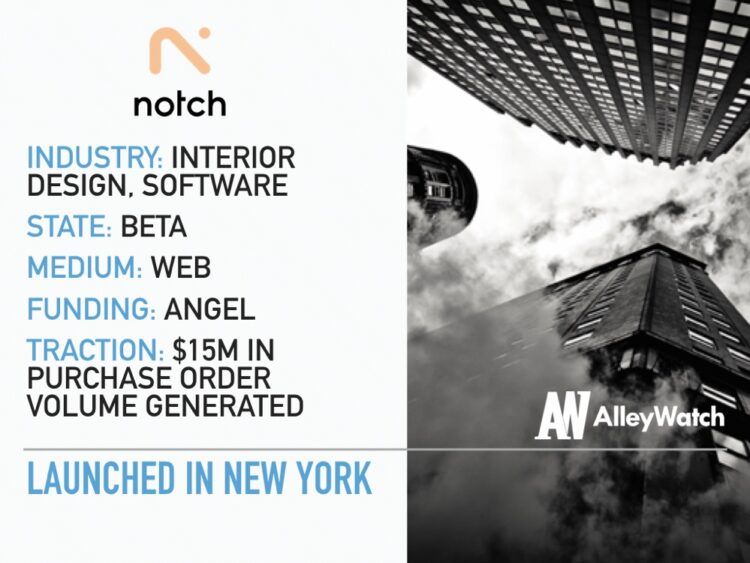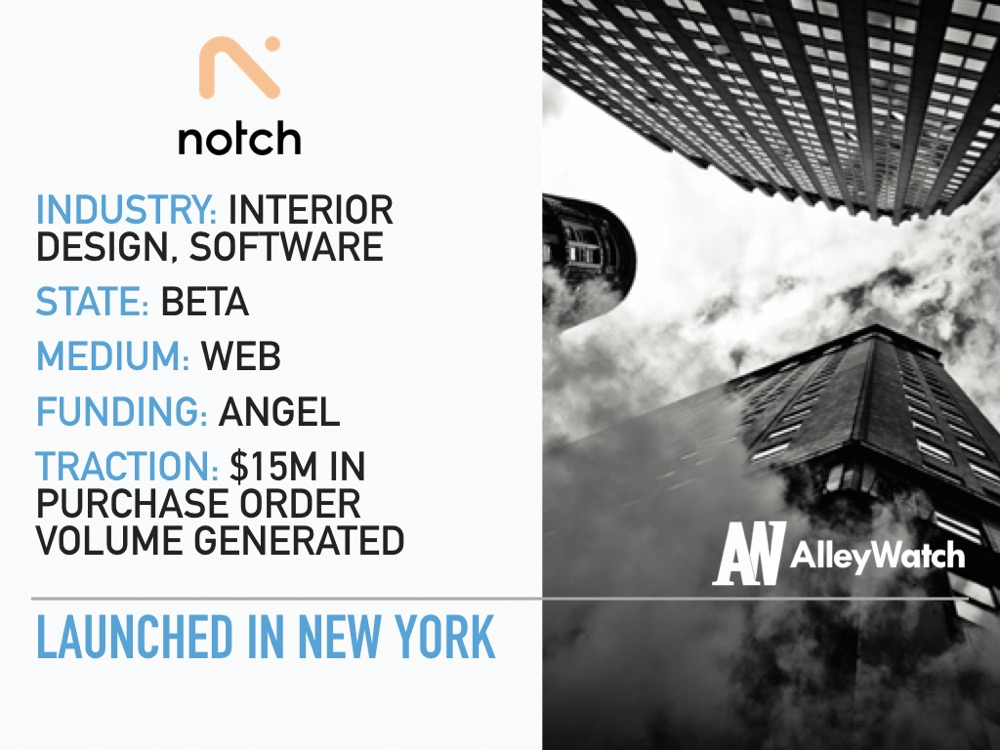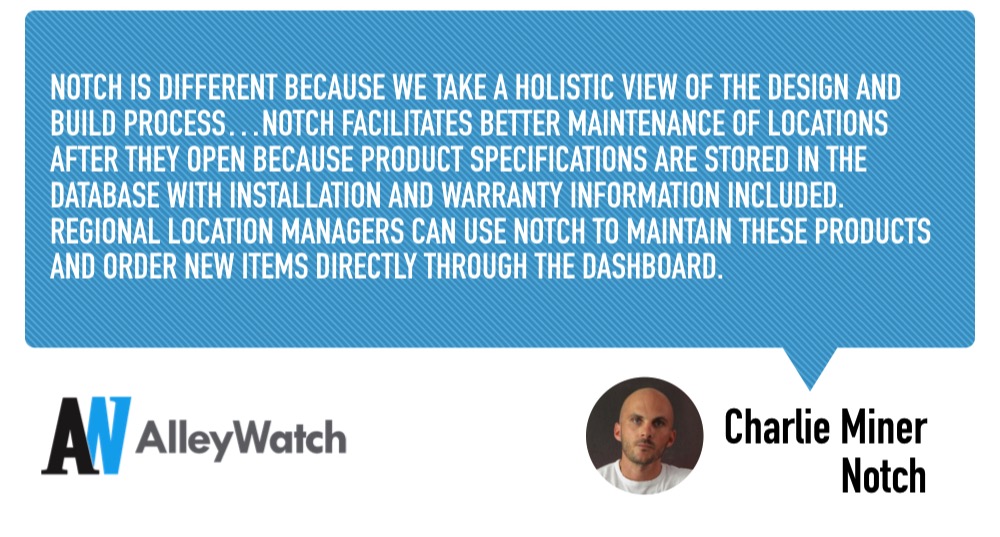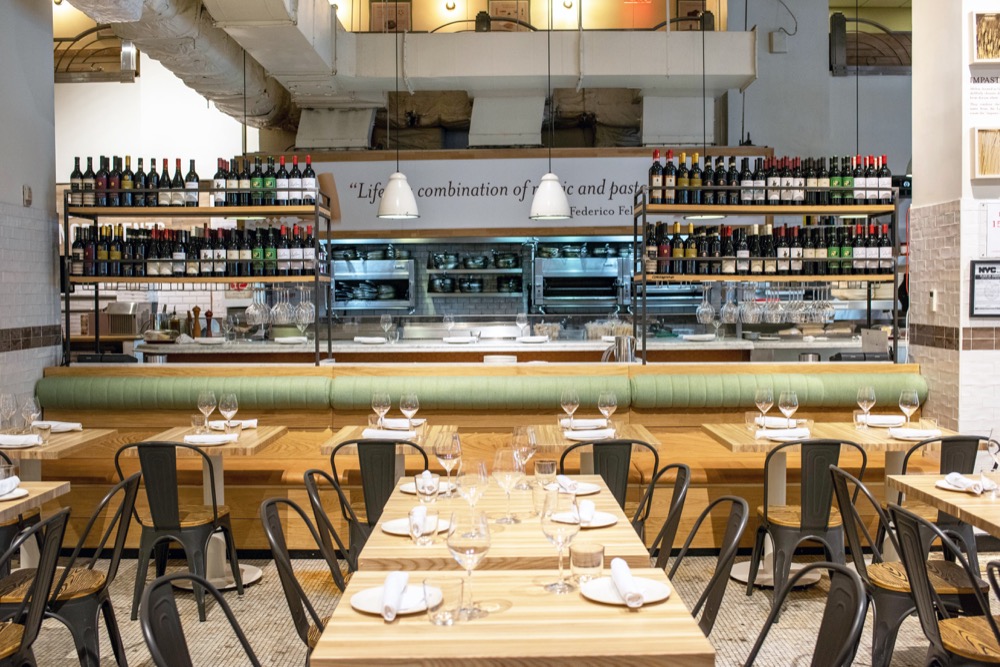One of the biggest challenges with multi-location franchises or businesses is ensuring that there is brand consistency throughout all the locations. Notch is the first software that systematically introduces the process to methodically plan, build, and furnish multiple spaces. Notch’s Furniture, Fixtures and Equipment (FF&E) procurement software creates tools allowing users to template repetitive workflows, automate multi-vendor purchasing, centralize project data, and track inventory assets. In addition to helping clients set up spaces, Notch goes a step further by assisting with maintenance of the space through its platform and making it easy for local managers to log repairs and order items directly through Notch. Notch currently has 20 accounts, 75 users, and 1500+ user hours spent on the platform.
AlleyWatch caught up with Founder Charlie Miner to learn more about Notch and the services it offers for its clients in the hospitality, flex office, restaurant, and retail industries.
Tell us about the product or service that Notch offers.
Notch is a first of its kind Furniture, Fixtures and Equipment (FF&E) procurement software. We help multi-location brands and businesses efficiently build spaces and maintain inventory assets with easy-to-use planning, specification, and purchasing tools.
What inspired the start of Notch?
We built Notch because we recognized inefficiencies in the planning and procurement space while building WorkOf and WorkOf Studio. We create time savings and efficiencies for our clients with features focused on project templating, automated multi-vendor procurement, inventory asset tracking, and project reporting.
Prior to Notch, key components of designing and building multi-location franchises and large-scale procurement were distributed across separate platforms, making collaboration difficult and leading to time-wasting redundancies.
Notch allows multi-location brands and businesses to open faster, for less cost, and maintain locations better over time. Notch is different because we take a holistic view of the design and build process, offering a single platform that connects teams through the lifecycle of a project, from planning and budgeting to procurement, installation, and ongoing maintenance. Our unique perspective means we’ve created tools for templating repetitive workflows, automating multi-vendor purchasing, centralizing project data, and tracking inventory assets.
After implementing Notch, clients have reduced time spent on ordering by 40%, have built brand-standards, and collaborated globally across locations to plan more efficiently.
Some of our value add differentiators include:
- Brand Catalogues – Notch enables businesses to maintain brand standards across locations with a centralized repository of product specification data and the ability to create unique catalogs based on product type, region, or client.
- Location Templates – Notch allows users to easily “turnkey” open standard location types by creating templates with pre-populated product data, project timelines, and notes on best practices.
- Multi-vendor Purchasing: Notch simplifies Multi-vendor bidding and purchasing with a Request for Quote feature that allows users to send out product bids to vendors and receive quotes directly into the ordering dashboard. Users can then automatically generate and send Purchase Orders to vendors while the status of product orders, shipments, and deliveries is tracked in the dashboard.
- Punch List – Notch connects teams working in the field with Punch List functionality that allows installers to track items as they are sent from the warehouse to the job site and flag issues like broken or missing pieces onsite in real-time.
- Integrated Inventory: Notch integrates a brand’s inventory and allows teams to easily pull items from warehouses into projects during the planning phase, move items from a location when it shuts down or dispatch items to locations when a product needs to be replaced.
- Day 2 + beyond – Notch facilitates better maintenance of locations after they open because product specifications are stored in the database with installation and warranty information included. Regional location managers can use Notch to maintain these products and order new items directly through the dashboard.
- Data + Reporting – Notch aggregates data across projects and gives decision-makers key insights on performance indicators like the time it takes to open a specific location type, to vendor lead times, break rates and pricing.
What market does Notch target and how big is it?
Notch works with real estate, hospitality, and multi-location brands (retail, fast food).
What is the business model?
Our current business model is a SaaS license fee either per user, per project or per year. We are testing a commission-based model taking 5 – 10% of the total purchase order volume by offering warehousing and installation services on select projects.
How has COVID-19 impacted the business?
Our main clients are designers and procurement teams working on construction projects in hospitality, flex office, restaurant, and retail. Everyone has been impacted significantly, for obvious reasons. That being said, now is the time to implement platforms that will create efficiencies for future scale and better ongoing business practices. For our clients, Notch is that platform.
What are the milestones that you plan to achieve within six months?
$500K ARR, 75 active accounts, V1 Beta complete.
What is the one piece of startup advice that you never got?
The one I’ve been thinking about a lot lately is pretty straightforward and may seem obvious but is very hard to execute: Your early product should be feature complete, not feature-rich.
If you could be put in touch with anyone in the New York community who would it be and why?
Charlie O’Donnell because of his commitment to backing founders in NYC and his focus on building community here. Knowing his portfolio, I also think he would understand what we are building. The Wing was one of our earliest clients, for example.
Charlie O’Donnell because of his commitment to backing founders in NYC and his focus on building community here. Knowing his portfolio, I also think he would understand what we are building. The Wing was one of our earliest clients, for example.
Why did you launch in New York?
Our business sits at the intersection of construction, technology, and design. There is no better city in the world to build a business with that focus.
What’s your favorite outdoor dining restaurant in NYC
I live in Cobble Hill and have always loved the scene at Abilene.
You are seconds away from signing up for the hottest list in New York Tech! Join the millions and keep up with the stories shaping entrepreneurship. Sign up today







